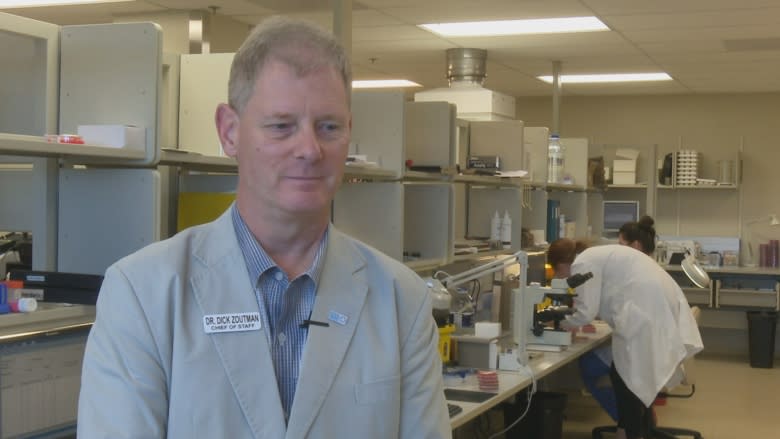Ontario parents struggle to get treatment for baby after suspected tick bite
An Ontario couple whose 10-month-old son was believed to have been bitten by a tick is urging other parents to check their children for bites — and to advocate for timely testing and a course of antibiotics long enough to treat the infection.
Tatiana Mitchell and Jeff Hathaway live near Orillia, Ont., and say they struggled to navigate the health-care system to get treatment for their son, Ben Mitchell Hathaway, after he developed three bull's-eye rashes in late May.
Mitchell first took to Ben to Orillia Soldiers' Memorial Hospital on June 1 when she saw the distinctive rashes on his arm, head and back.
'Camp out, get antibiotics'
But when her son wasn't prescribed any medication, she returned the next day and convinced a doctor to give Ben a round of antibiotics. Friends on Facebook had urged the couple to get a second opinion after Mitchell posted pictures of the baby's rash, she said.
"There was a huge explosion online from a bunch of people who have Lyme, chronic Lyme, who told me go back, camp out, get antibiotics."
The couple had Ben tested for Lyme disease on June 5 at Toronto's Hospital for Sick Children. That test came back negative, the Orillia mother said.
After that, Mitchell and Hathaway took their son to see a specialist in Plattsburgh, N.Y., on June 22, where he was prescribed more antibiotics. In both Ontario and the U.S., Ben was treated with amoxicillin, an antibiotic used to treat various bacterial infections.
"By all accounts, he's being treated and he's seems to be doing very well," Hathaway said of his son. "The doctor in New York thought he's looking great. We have no reason to think that it isn't going to respond well to the treatment."
But getting to that point was a struggle.
Pegged as 'anxious mother'
Mitchell said that she called her family doctor after she first came home without antibiotics, but said she was told Ben didn't need to be checked out if he had already been to the hospital. So the couple went online, found out that ticks do not need to be attached to transmit Lyme disease, and printed a map showing the risk areas for the disease in Ontario.
Armed with that information, Mitchell returned to the hospital.
She said she thinks she was given antibiotics because the doctor thought she was an "anxious mom."
Ben seemed to improve after a week, with the rashes disappearing in about five days. Ben had been given three weeks of amoxicillin, but his parents took him to the U.S., where they received two more weeks of antibiotics. They say they want to see longer courses of antibiotics offered here.
Hospital protocol
A spokesman for Orillia Soldiers' Memorial Hospital said in a statement that the hospital cannot discuss the specifics of Ben's case, but noted staff are required to follow a specific protocol if someone presents with Lyme disease symptoms.
That includes "consultation with multiple physicians and the Simcoe Muskoka District Health Unit to determine if further testing is recommended," Terry Dyni said in a statement.
If testing is needed, Dyni said the hospital will get it done through the province's public health laboratory.
Hathaway said going to the U.S. was costly but it gave the couple more options for treatment. He and his partner plan to follow up with the specialist there.
He thinks he may have brought the tick home with him after doing field work in southwestern Ontario, where the arachnids are more prevalent.
"It could have hitchhiked a ride on my clothes or my backpack," he said, saying that's happened before.
Diagnosis of Lyme disease seems to be done based on symptoms in Ontario because it takes a long time to get test results, Hathaway said.
Hathaway and Mitchell said they want better testing of Lyme disease and the option for longer courses of antibiotics, which are available in the U.S.
Months of antibiotics unnecessary: specialist
Dr. Dick Zoutman, an infectious disease specialist and chief of staff at Quinte Health Care in Belleville, Ont., said Lyme disease is increasing across the province — but months of antibiotics are not necessary.
"That is not the standard treatment," he said. "It has not been validated in clinical trials."
Zoutman said treatment for suspected Lyme disease works very well and the current guidelines call for two to three weeks of antibiotics. If a physician suspects "neurological involvement" a longer course of medication might be appropriate, he said.
But Zoutman said he is confident in the quality of testing for Lyme disease in Ontario.
"We need to be aware," he said. "Parents advocate for their children, we advocate for ourselves. We all have to be on the lookout."




